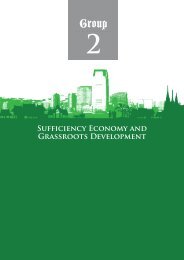Conflict, Legitimacy and Government Reform: Equitable Allocation of ...
Conflict, Legitimacy and Government Reform: Equitable Allocation of ...
Conflict, Legitimacy and Government Reform: Equitable Allocation of ...
You also want an ePaper? Increase the reach of your titles
YUMPU automatically turns print PDFs into web optimized ePapers that Google loves.
Panel Discussion<br />
tax rate <strong>of</strong> an indirect tax is regressive <strong>and</strong> the more government relies on<br />
indirect taxes, the heavier tax burden will be borne by the poor.<br />
Consequently, indirect taxation reduces the poor’s income even more or<br />
increases inequality, implying that the poor subsidizes the rich through<br />
taxation.<br />
Thail<strong>and</strong> does not have other direct taxes used in foreign countries<br />
as a supplementary measure to mitigate inequality or even though it has<br />
some but they are underdeveloped. They include property tax,<br />
inheritance tax, capital gain tax <strong>and</strong> interest income tax. Presently, the<br />
withholding tax rate <strong>of</strong> the last one is only 15%, which is rather low<br />
compared to other income taxes.<br />
Table 5: Proportion <strong>of</strong> direct <strong>and</strong> indirect taxes in Engl<strong>and</strong>,<br />
Europe <strong>and</strong> Thail<strong>and</strong> in 2000s (%)<br />
Country Direct taxes Indirect taxes Total<br />
Engl<strong>and</strong> 51.6 49.4 100.0<br />
Europe (average) 50.0 50.0 100.0<br />
Thail<strong>and</strong> 40.5 59.5 100.0<br />
Source: OECD, Ministry <strong>of</strong> Finance<br />
Most revenue <strong>of</strong> Thai government comes from indirect taxes (valueadded<br />
tax, excise tax, oil tax, cigarette tax, liquor tax etc.). During late<br />
1980s - late 1990s, the proportion <strong>of</strong> this revenue was as high as 80 per<br />
cent <strong>of</strong> total tax revenue but presently this proportion came down to 60<br />
per cent while in developed countries like OECD, the share <strong>of</strong> indirect<br />
taxes is around 50 per cent (Table 5).<br />
As mentioned above, indirect taxes are regressive, that is, the poor<br />
bear a higher tax burden than the rich, thus increasing inequality. Thus,<br />
in Thail<strong>and</strong> our taxation system is rather unfriendly to the poor <strong>and</strong><br />
contributes to exacerbation <strong>of</strong> inequality. Available relevant studies<br />
support this conclusion (Medhi, 1975; Wiboonlak, 1983; Wit, 1977;<br />
TDRI, 2003; Pichit, 1986; Duangmanee <strong>and</strong> associates, 2009; Hyun<br />
Hwa Son, n.d.).<br />
53














